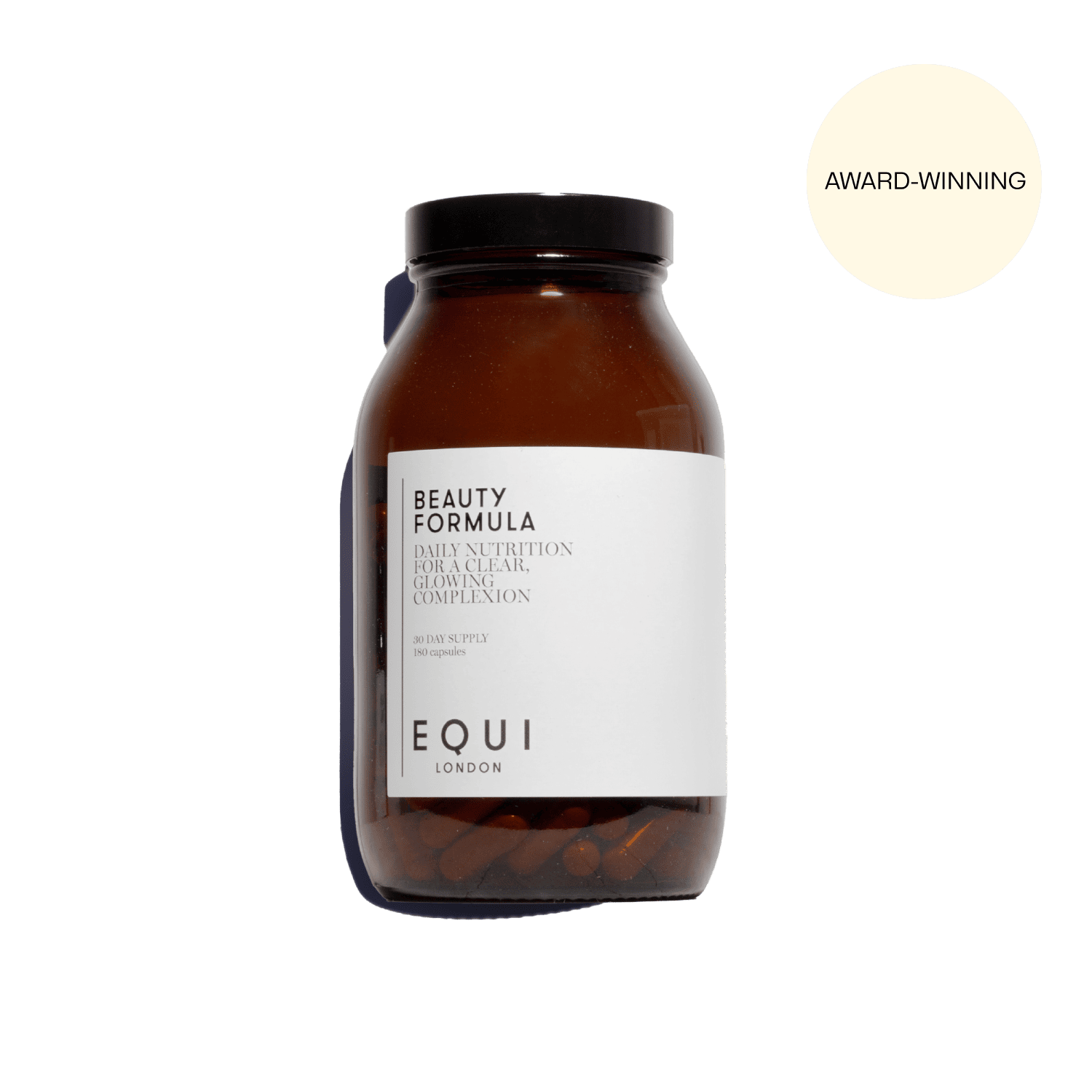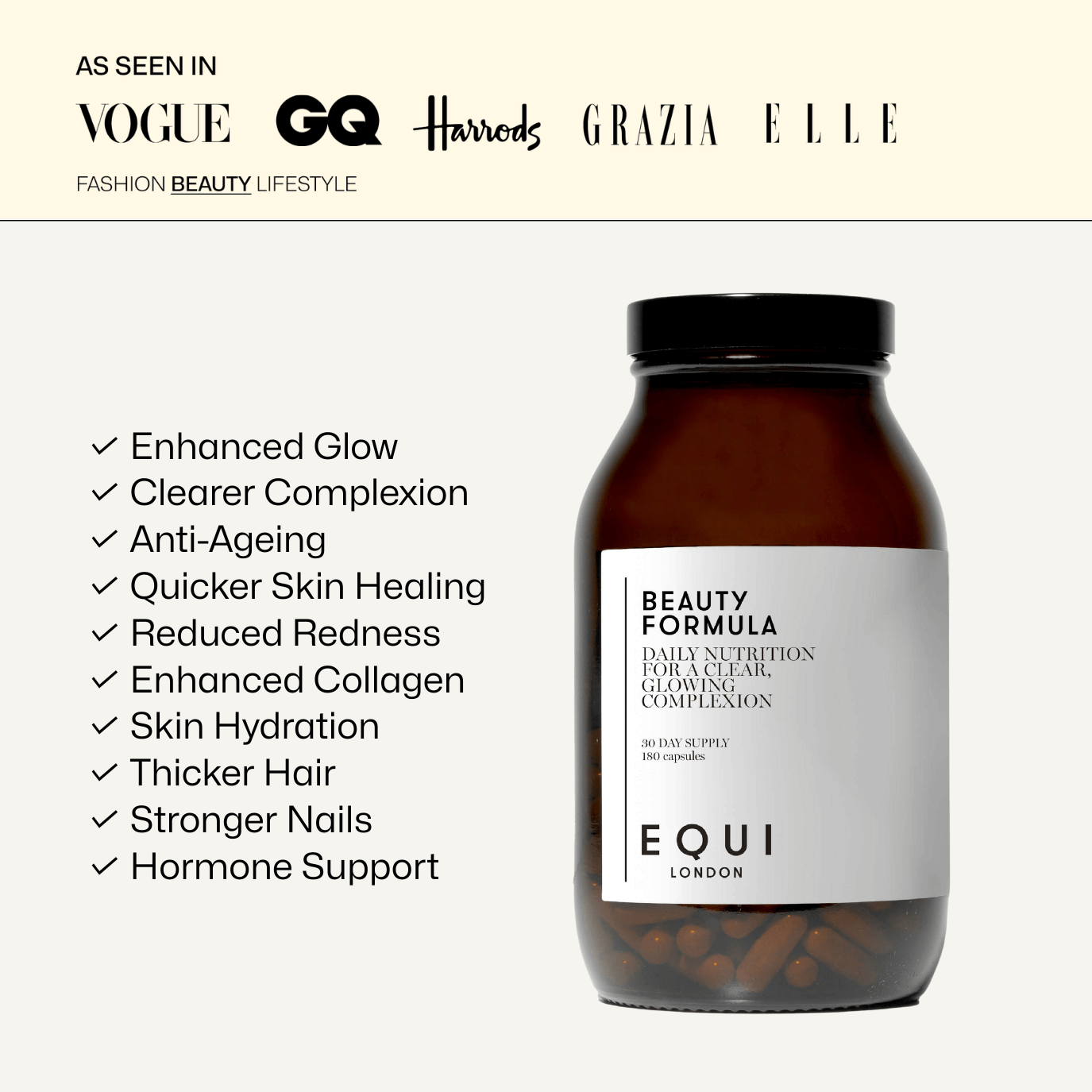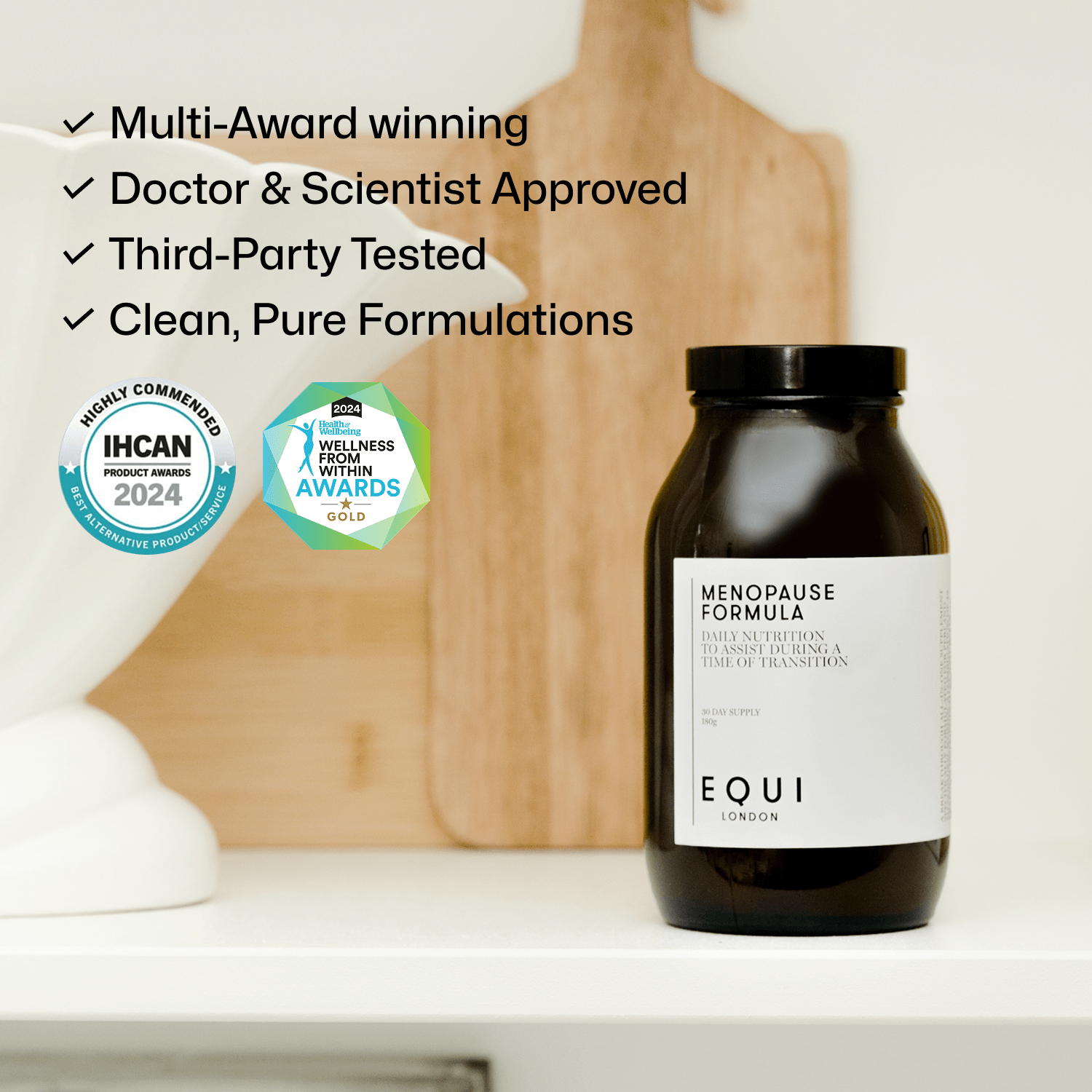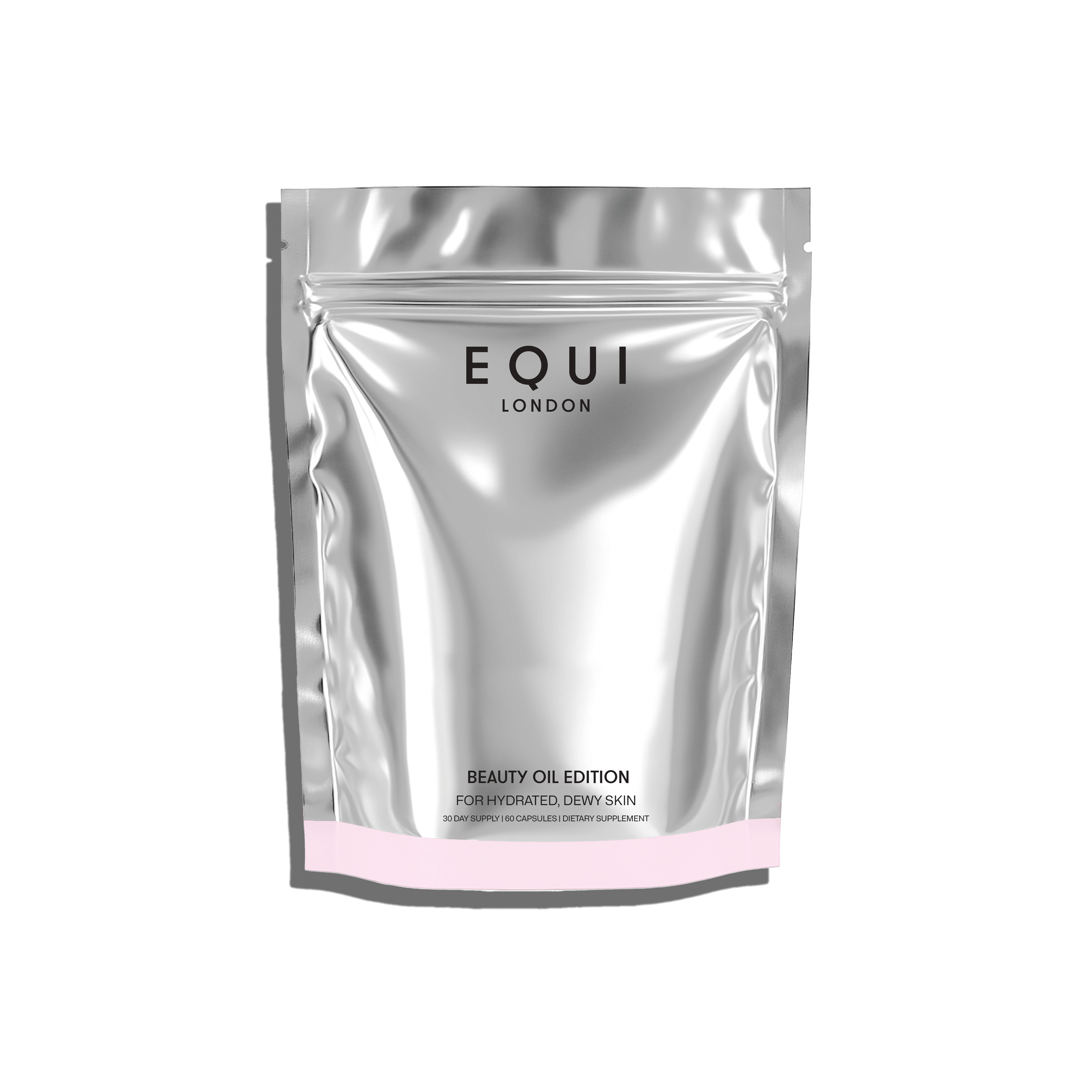Navigating the complex journey of perimenopause, many women encounter a number of symptoms that signal a shift in their body’s hormonal landscape. Central to this transition but perhaps less talked about is the decline in progesterone, a key hormone that, when at optimal levels, maintains harmony in our health. Today’s blog will shed light on low progesterone, highlighting the role of targeted key nutrients and lifestyle interventions in managing its challenges. Perimenopause marks a period of change leading up to menopause, characterised by fluctuations in hormone levels, including a decrease in progesterone. This decline can manifest through various signs and symptoms, significantly impacting us. During this time, we may experience sleep disturbances, mood swings, reduced stress resilience, and breakouts, signalling the need for a balanced approach to restore hormonal EQUIlibrium.
Addressing low progesterone goes beyond managing symptoms; it encompasses a holistic strategy aimed at nurturing the body’s inherent ability to maintain hormonal balance. Key nutrients play an important role in this process. Vitamin C, B6, magnesium, zinc, and omega-3 fatty support our hormonal health, each contributing uniquely to support progesterone levels. Vitamin C aids in enhancing the function of the corpus luteum, the source of progesterone post-ovulation, while B6 and magnesium work synergistically to improve mood and sleep quality. Zinc facilitates the pituitary gland’s release of hormones essential for progesterone production, and omega-3 fatty acids reduce inflammation, fostering an environment conducive to hormonal balance. However, addressing low progesterone extends beyond nutrition. Lifestyle interventions are just as crucial in managing perimenopausal symptoms. Supporting restful sleep, reducing stress through mindfulness and relaxation techniques, moderating alcohol intake, and engaging in regular physical activity form the pillars of a lifestyle that promotes our hormonal health. These practices, coupled with nutritional support, lay the foundation for a smoother transition through perimenopause.
Menopause Formula emerges as a beacon of support here. Specially formulated to address the nuances of perimenopause, it encapsulates the essence of nutritional and lifestyle strategies to manage hormonal fluctuations. By integrating this Formula into daily routines, women can empower themselves to navigate the challenges of perimenopause, ensuring a journey marked by wellness and vitality. Thanks to the inclusion of some star ingredients, Menopause Formula provides a holistic approach to low progesterone, offering support for mood, sleep, hormonal detoxification, and overall well-being. By addressing the body's needs in harmony, it empowers women to navigate the natural changes of menopause healthily and happily.
Understanding Low Progesterone Signs and Symptoms
Low progesterone levels, a common issue especially during perimenopause, can have far-reaching effects on both physical health and emotional well-being. Progesterone is more than just a reproductive hormone; it plays a crucial role in maintaining various bodily functions and emotional balance. When its levels fall, the repercussions can be profound, affecting everything from sleep quality to mood stability. One of the common symptoms of low progesterone is sleep disturbances. Progesterone has a sedative effect on the brain, helping to promote restful sleep. When levels drop, we may experience insomnia or broken sleep patterns, significantly impacting our overall health and quality of life. Research highlights the relationship between hormonal imbalances and sleep disorders, emphasising the importance of maintaining balanced hormone levels for optimal sleep health (1). Progesterone also influences skin health. It stimulates skin elasticity and promotes hydration. A decrease in progesterone can lead to skin issues such as breakouts, dryness, and acne, especially in women who are predisposed to hormonal acne. The link between hormone fluctuations and skin health is well-documented, with research illustrating how hormonal imbalances can exacerbate skin conditions (2). Perhaps one of the most challenging aspects of low progesterone is its impact on mood. Progesterone is known to exert a calming effect on the brain, acting on GABA receptors, which are involved in mood regulation. Low levels can lead to a noticeable dip in mood, feelings of sadness, or anxiety. Finally, low progesterone can impair the body's ability to cope with stress. Progesterone counteracts the effects of cortisol, the stress hormone. When progesterone is low, cortisol's effects can be more pronounced, making individuals feel more overwhelmed by daily stressors and less able to manage stress effectively. Research has explored the intricate relationship between cortisol, progesterone, and stress resilience (3), emphasising the balancing act these hormones play in managing stress.
Key Nutrients to Support Low Progesterone
Diet is a cornerstone of hormonal health, playing a pivotal role in regulating and supporting hormone production including progesterone. Essential for reproductive health, progesterone balance is crucial for menstrual regularity, fertility, and even mood regulation. Our hormones are profoundly influenced by the nutrients we consume and incorporating key nutrients into your diet can significantly support your body's natural production of progesterone, enhancing overall well-being. These include vitamin C, B6, magnesium, zinc, and omega-3 fatty acids.
Vitamin C – Supporting Progesterone Synthesis
Whilst vitamin C is renowned for its immune-boosting capabilities, it also plays a crucial role in the synthesis of progesterone. Research has shown that vitamin C enhances the functioning of the corpus luteum, which produces progesterone in the ovaries. Foods rich in vitamin C, such as citrus fruits, berries, tomatoes, and peppers, can contribute to maintaining adequate progesterone levels. In fact, research revealed that vitamin C supplementation improved hormone levels and increased fertility in women with luteal phase defect (4).
Vitamin B6 - Supporting Liver Function and Hormone Regulation
Essential for liver function, B6 plays a pivotal role in hormone regulation and metabolism. B6 also contributes to the regulation of oestrogen and progesterone balance, making it vital for menstrual health and fertility (5). Foods like turkey, bananas, and spinach are excellent sources of vitamin B6.
Magnesium - Facilitating Progesterone Production
This mineral supports the pituitary gland, which controls the production of follicle-stimulating hormone (FSH) and luteinising hormone (LH), both of which are crucial for ovulation and subsequent progesterone production. Incorporating supplemental forms of magnesium and magnesium-rich foods such as dark leafy greens, nuts, and whole grains can therefore support progesterone levels.
Zinc - Essential for Ovulation
Zinc plays a vital role in the reproductive system, supporting ovulation and progesterone production. Zinc-rich foods like beef, pumpkin seeds, and lentils can contribute to maintaining healthy progesterone levels. Studies highlight the link between zinc intake and fertility, emphasising zinc's significance in reproductive health.
Omega-3 Fatty Acids - Reducing Inflammation and Supporting Hormonal Health
Omega-3 fatty acids, found in fatty fish, flaxseeds, and walnuts, are known for their anti-inflammatory properties, which can positively impact hormonal health and support progesterone production.
Menopause Formula contains 48 premium, bio-available nutrients to boost & balance the female body during a time of transition. Within this Formula, there lies an advanced multivitamin and mineral complex containing a spectrum of bio-available, high-quality vitamins and minerals including vitamin C, B6, magnesium and zinc to support healthy progesterone levels. We created Menopause Oil Edition which complements Menopause Formula perfectly, providing a nutrient-rich blend of 6 pure oils including omega 3, selected to hydrate and combat inflammation throughout the body. Purchase Total Menopause here.
Lifestyle Interventions for Enhancing Progesterone Levels
Addressing lifestyle factors is key in managing low progesterone levels, offering a holistic approach to enhancing hormonal health. While diet and nutrition are key components, lifestyle interventions play a crucial role in creating an optimal environment for hormone regulation, including progesterone. For example, quality sleep is foundational to hormone balance. The body’s circadian rhythms, which regulate sleep-wake cycles, are intimately connected to hormonal release patterns, including progesterone. Establishing a regular sleep routine, ensuring a dark, quiet sleeping environment, and avoiding blue light exposure before bedtime can significantly improve sleep quality and, consequently, hormone balance. Research highlights that disrupted sleep patterns can significantly affect female reproductive hormone levels, emphasising the importance of sleep in maintaining hormonal health (6). Stress is another notorious disruptor of hormonal balance, primarily through its impact on cortisol levels. High cortisol can inhibit progesterone production, as the body diverts precursors to support cortisol synthesis in response to stress. Engaging in stress-reduction practices like meditation, yoga, or deep breathing exercises can help lower cortisol levels and support progesterone balance. Aside from sleep and stress, alcohol consumption can also disrupt hormonal balance, affecting the liver's ability to metabolise hormones and impacting progesterone levels. Moderating alcohol intake is a practical step toward supporting hormonal health. Research has found that alcohol intake can acutely affect serum progesterone levels in women, underscoring the need for moderation to maintain hormonal EQUIlibrium (7). Finally, adopting habits that nurture overall hormonal health can indirectly boost progesterone levels. This includes regular physical activity, maintaining a healthy weight, and ensuring adequate nutrient intake. Physical activity, in particular, has been shown to positively influence hormonal health by improving insulin sensitivity and reducing inflammation.
Incorporating these lifestyle interventions can create a supportive environment for hormone regulation, contributing to the management of low progesterone levels. By addressing sleep, stress, alcohol intake, and overall hormonal health, individuals can take proactive steps toward enhancing their progesterone levels and improving their reproductive health and well-being.
How Menopause Formula Helps
Navigating the transitional phase of perimenopause can often feel challenging. The hormonal fluctuations characteristic of this period lead to a myriad of physical and emotional challenges. Our best-selling Menopause Formula offers a holistic approach to managing the symptoms associated with perimenopause including the broader spectrum of hormonal imbalances during perimenopause and low progesterone. Menopause Formula isn't just a supplement; it's a comprehensive support system designed to address the multifaceted needs of women navigating the complexities of perimenopause and menopause. By integrating key nutrients like vitamin C, B6, magnesium, and zinc, which directly support progesterone synthesis and balance, the formula lays the groundwork for hormonal equilibrium. And we haven’t stopped there – we have included star ingredients which go the extra mile. For example, KSM66® ashwagandha and rhodiola in Menopause Formula, are recognised for their potent adaptogenic properties. These herbs have been scientifically proven to boost mood, enhance sleep quality, and calm anxiety, helping to restore adrenal health and prevent burnout. Studies on ashwagandha and rhodiola have demonstrated their efficacy in improving stress resilience and overall well-being (8,9). Furthermore, flaxseed extract plays a pivotal role in oestrogen detoxification, promoting a balanced ratio of oestrogen to progesterone. This balance is crucial for mitigating symptoms such as mood swings, sleep disturbances, and hormonal acne often exacerbated during perimenopause. The inclusion of dong quai, sage and hops extract further supports the regulation of hormonal activity, offering relief from hot flashes and other menopausal symptoms.
The liver is instrumental in hormone metabolism and detoxification. Ingredients like milk thistle, N-acetyl cysteine, and choline are incorporated for their liver-supporting benefits. These compounds aid in detoxifying excess hormones, including oestrogen, thereby supporting hormonal balance. Their antioxidant and anti-inflammatory properties also contribute to overall health and resilience during this transitional phase.
Menopause Formula is more than a supplement; it's the result of our belief that the journey into menopause should be one of empowerment rather than overwhelm. Its expertly blended combination of 48 science-based nutrients works synergistically to restore vibrancy, fortify the female body, and support a smooth transition through perimenopause and into menopause. Purchase Menopause Formula here.
References
- Baker FC, Lee KA. (2018). Menstrual Cycle Effects on Sleep. Sleep Med Clin. 13(3), pp. 283-294.
- Zaenglein, A.L., et al. (2016). 'Guidelines of care for the management of acne vulgaris'. Journal of the American Academy of Dermatology, 74(5), pp. 945-973.e33
- Herrera AY, Nielsen SE, Mather M. (2016). Stress-induced increases in progesterone and cortisol in naturally cycling women. Neurobiol Stress. 11;3, pp. 96-104.
- Henmi, H., et al. (2003). 'Effects of ascorbic acid supplementation on serum progesterone levels in patients with a luteal phase defect'. Fertility and Sterility, 80(2), pp. 459-461.
- Fathizadeh, S., et al. (2010). 'Evaluating the effect of magnesium and magnesium plus vitamin B6 supplement on the severity of premenstrual syndrome'. Iranian Journal of Nursing and Midwifery Research, 15(Suppl1), pp. 401-405.
- Lateef OM, Akintubosun MO. (2020). Sleep and Reproductive Health. J Circadian Rhythms. 18:1.
- Gill J. (2000). The effects of moderate alcohol consumption on female hormone levels and reproductive function. Alcohol Alcohol. 35(5), pp. 417-23.
- Auddy, B., Hazra, J., Mitra, A., Abedon, B., & Ghosal, S. (2008). 'A standardized Withania somnifera extract significantly reduces stress-related parameters in chronically stressed humans: a double-blind, randomized, placebo-controlled study.' The Journal of the American Nutraceutical Association.
- Edwards, D., Heufelder, A., & Zimmermann, A. (2012). 'Therapeutic effects and safety of Rhodiola rosea extract WS® 1375 in subjects with life-stress symptoms – results of an open-label study.' Phytotherapy Research, pp. 1220-5












